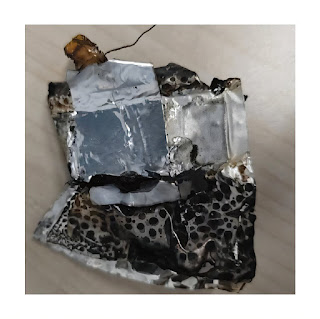Flame-retardant
interfaces regulate dangerous gas production during battery overheating,
slashing explosion risks. Credit: Ying Zhang
Researchers have designed a working
prototype of a lithium metal battery equipped with a built-in fire
extinguisher, which is activated if the battery overheats.
Lithium metal batteries are
currently in limited use but have huge potential because they can store ten
times as much energy as lithium-ion batteries. They deliver high energy density, which means they can store large amounts of energy relative to their
size. This makes them ideal for electric vehicles, portable electronics and plenty of other energy-hungry devices.
Risk of fires and explosions
However, there is a problem. These
types of batteries use lightweight lithium metal anodes and high-voltage
nickel-rich oxide cathodes, a setup that can produce flammable gases. If these
gases build up in a battery, they can cause fires or explosions.
To tackle this, Ying Zhang and
colleagues at the Institute of Chemistry, Chinese Academy of Sciences,
incorporated a flame-retardant polymer into the cathode of their prototype
lithium metal battery.
Published in Proceedings of the National Academy of Sciences, the researchers exposed the prototype battery and a standard lithium metal battery to gradually increasing temperatures, starting at 50 °C. When temperatures exceeded 100°C, both batteries began to overheat.
Evolution of Chemical Maps for FRI@NCM811
Cathodes During ToF-SIMS Analysis. The video illustrates the chemical map
evolution of FRI@NCM811 cathodes observed in a time-of-flight secondary ion
mass spectrometry (ToF-SIMS) test. The playback speed has been accelerated 20
times for clarity and visualization. Credit: Proceedings of the
National Academy of Sciences (2025). DOI: 10.1073/pnas.2501549122
However, in the prototype, the
special polymer started to break down and release chemicals (flame-inhibiting
radicals) that acted like mini fire extinguishers. Specifically, they
suppressed reductive reactions at the anode that are responsible for generating
flammable gases.
When temperatures rose beyond 120
°C, the standard battery overheated to 1,000 °C within 13 minutes and burst
into flames. Meanwhile, under the same experimental conditions, the prototype
with the flame-retardant polymer reached a peak temperature of 220 °C and did
not catch fire or explode.
"This smart gas management strategy enhances both thermal safety and electrochemical stability, offering a transformative pathway to fire-safe Li metal batteries for advanced energy storage applications," explained the researchers in their paper.
Safer batteries
If this fire-suppressing technology
proves successful on a large scale, it could be a game changer for safer
batteries in everything from portable electronics and medical devices to grid storage and electric vehicles. By
reducing the risk of fires, this breakthrough could also encourage more people
to switch their gas-guzzling cars for electric ones, as safety concerns are one
reason some people remain hesitant.
Additionally, with a few modifications, the flame-retardant material can be incorporated into batteries using existing battery production methods, which could help speed up their rollout and acceptance.
Source: Built-in extinguishers can prevent battery fires and explosions


No comments:
Post a Comment